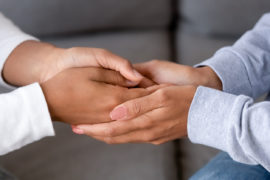 Glossy magazine spreads of supermodels and bone-thin celebrities have gone a long way toward making the average everyday woman feel like she’s not good enough. But if you’re struggling with Borderline Personality Disorder (BPD), depression, or an anxiety disorder, feelings of inadequacy can multiply exponentially. You already feel like you’re under a microscope. You’re already feeling not good enough and that you can’t control your life. The one thing you can control is your food.
Glossy magazine spreads of supermodels and bone-thin celebrities have gone a long way toward making the average everyday woman feel like she’s not good enough. But if you’re struggling with Borderline Personality Disorder (BPD), depression, or an anxiety disorder, feelings of inadequacy can multiply exponentially. You already feel like you’re under a microscope. You’re already feeling not good enough and that you can’t control your life. The one thing you can control is your food.
Though the picture perfect images that surround us in the media don’t help, it’s only part of the problem. The favorable signals initially received when you start to exhibit what may eventually become the signs of eating disorder (i.e., losing weight) are confusing. Positive feedback for being thin becomes addictive.
Often, even negative feedback becomes fuel for the fire. “You’re getting too thin” can be translated as “success.” You may even think, “at least I’m not self-medicating with alcohol or drugs.”
Eating Disorder Symptoms
Maybe you don’t even realize that your “crash diet” has become an eating disorder. The National Eating Disorder Association defines symptoms of eating disorder as including the following:
- Dramatic weight loss
- Dressing in layers to hide weight loss
- Preoccupation with weight, food, calories, fat grams, and dieting
- Refusing to eat certain food, progressing to refusal of entire categories of food
- Making frequent comments about feeling “fat,” despite weight loss
- Complaining of constipation, cold intolerance, lethargy, and excess energy
- Denying feeling hungry
- Developing food rituals
- Steals or hoards food in strange places
- Binge eating, then purging
- Drinking excessive amounts of water
- Teeth are discolored, stained
- Having a strong need for control
Risks of Eating Disorders
The sense of control that comes with starving yourself, over-exercising, or purging must be understood as a temporary one. Starving your body means starving your brain of the nutrients you need to thrive and, ultimately, battle what might be a co-occurring disorder that is at the root of your eating disorder.
The National Association of Anorexia Nervosa and Associated Disorders (ANAD) estimates that up to 24 million people of all ages and genders suffer from an eating disorder in the United States, and that 50 percent of these people meet the criteria for severe depression.
As you self-medicate by restricting your food intake, you are actually propelling yourself toward dangerous, sometimes fatal, levels of malnutrition.
Statistically, eating disorders have the highest mortality rate of any mental illness, yet ANAD reports that only 35 percent of those suffering with eating disorder get help at a treatment center that specializes in eating disorders. If you are struggling with an eating disorder, in addition to Borderline Personality Disorder, it is important to get help before your symptoms get worse.




2 Comments
Pingback: Dealing with Unfulfilled Expectations & Borderline Personality Disorder | Borderline Personality Treatment
Pingback: The Importance of Knowing Your BPD Triggers | Borderline Personality Treatment